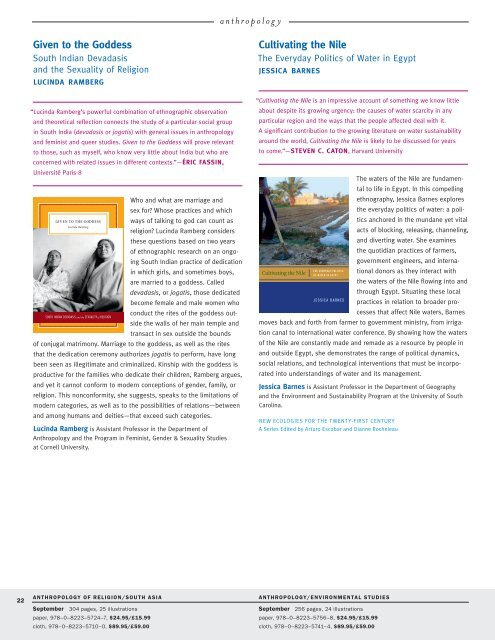x1vuD
x1vuD
x1vuD
You also want an ePaper? Increase the reach of your titles
YUMPU automatically turns print PDFs into web optimized ePapers that Google loves.
anthropolog y<br />
Given to the Goddess<br />
South Indian Devadasis<br />
and the Sexuality of Religion<br />
lucinda ramberg<br />
Cultivating the Nile<br />
The Everyday Politics of Water in Egypt<br />
jessica barnes<br />
“Lucinda Ramberg’s powerful combination of ethnographic observation<br />
and theoretical reflection connects the study of a particular social group<br />
in South India (devadasis or jogatis) with general issues in anthropology<br />
and feminist and queer studies. Given to the Goddess will prove relevant<br />
to those, such as myself, who know very little about India but who are<br />
concerned with related issues in different contexts.”—ÉRIC FASSIN,<br />
Université Paris-8<br />
Who and what are marriage and<br />
sex for Whose practices and which<br />
Given to the Goddess ways of talking to god can count as<br />
Lucinda Ramberg<br />
religion Lucinda Ramberg considers<br />
these questions based on two years<br />
of ethnographic research on an ongoing<br />
South Indian practice of dedication<br />
in which girls, and sometimes boys,<br />
are married to a goddess. Called<br />
devadasis, or jogatis, those dedicated<br />
become female and male women who<br />
conduct the rites of the goddess outside<br />
the walls of her main temple and<br />
SOUTH INDIAN DEVADASIS and the SEXUALITY of RELIGION<br />
transact in sex outside the bounds<br />
of conjugal matrimony. Marriage to the goddess, as well as the rites<br />
that the dedication ceremony authorizes jogatis to perform, have long<br />
been seen as illegitimate and criminalized. Kinship with the goddess is<br />
productive for the families who dedicate their children, Ramberg argues,<br />
and yet it cannot conform to modern conceptions of gender, family, or<br />
religion. This nonconformity, she suggests, speaks to the limitations of<br />
modern categories, as well as to the possibilities of relations—between<br />
and among humans and deities—that exceed such categories.<br />
Lucinda Ramberg is Assistant Professor in the Department of<br />
Anthropology and the Program in Feminist, Gender & Sexuality Studies<br />
at Cornell University.<br />
“Cultivating the Nile is an impressive account of something we know little<br />
about despite its growing urgency: the causes of water scarcity in any<br />
particular region and the ways that the people affected deal with it.<br />
A significant contribution to the growing literature on water sustainability<br />
around the world, Cultivating the Nile is likely to be discussed for years<br />
to come.”—STEVEN C. CATON, Harvard University<br />
The waters of the Nile are fundamental<br />
to life in Egypt. In this compelling<br />
ethnography, Jessica Barnes explores<br />
the everyday politics of water: a politics<br />
anchored in the mundane yet vital<br />
acts of blocking, releasing, channeling,<br />
and diverting water. She examines<br />
the quotidian practices of farmers,<br />
government engineers, and international<br />
donors as they interact with<br />
The e veryday PoliT ics<br />
Cultivating the Nile<br />
of waT er in egyPT<br />
the waters of the Nile flowing into and<br />
through Egypt. Situating these local<br />
jessica barnes<br />
practices in relation to broader processes<br />
that affect Nile waters, Barnes<br />
moves back and forth from farmer to government ministry, from irrigation<br />
canal to international water conference. By showing how the waters<br />
of the Nile are constantly made and remade as a resource by people in<br />
and outside Egypt, she demonstrates the range of political dynamics,<br />
social relations, and technological interventions that must be incorporated<br />
into understandings of water and its management.<br />
Jessica Barnes is Assistant Professor in the Department of Geography<br />
and the Environment and Sustainability Program at the University of South<br />
Carolina.<br />
NEW ECOLOGIES FOR THE TWENTY-FIRST CENTURY<br />
A Series Edited by Arturo Escobar and Dianne Rocheleau<br />
22<br />
ANTHROPOLOGY OF RELIGION/SOUTH ASIA<br />
September 304 pages, 25 illustrations<br />
paper, 978–0–8223–5724–7, $24.95/£15.99<br />
cloth, 978–0–8223–5710–0, $89.95/£59.00<br />
ANTHROPOLOGY/ENVIRONMENTAL STUDIES<br />
September 256 pages, 24 illustrations<br />
paper, 978–0–8223–5756–8, $24.95/£15.99<br />
cloth, 978–0–8223–5741–4, $89.95/£59.00


